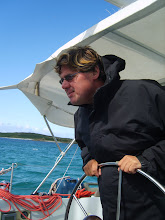The start of another round of hopefully interesting talks about e-learning. I'm going to try to post a bit more about each talk as we go along.
The first talk saw a power broker and a politician but frankly, she couldn't keep me alert until my first dose of coffee. Neelie Kroes undoubtedly is a very powerful person. She will control a lot of money in the IT field, and that is good. The talk, however, wasn't all that engaging. And of course I got up at 4:35 this morning, so it takes a bit of entertaining to keep my attention.
This was very well done by the second speaker, Peter Nowak. It wasn't always clear what his talk had to do with e-learning, but it certainly had to do with learning and teaching. We don't always realize what prosperity does for the opportunities to learn, but he got that point across.
By this time, I was getting ready for a bit of caffeine, but the third speaker made up for my lack of stimulants with his talk about access to on-line knowledge. Especially the part about the increase of a finding-based learning experience as opposed to a push-style learning, is very convincing. Apparently even the globally measured IQ is rising as a consequence of this. We may know less trivia, but we know much better where to find them.
After these provoking thoughts, I was ready for coffee and as it was already 11:15, I rushed for the door and caffeine-induced salvation.
1 Dec 2011
12 Oct 2011
Testing complexity
With eighteen months since going live on our new electronic testing platform, integration is still key.
Our organization has got over 10 years experience with electronic testing. We've spent many tens of thousands of Euros on our platform and content. Out of necessity rather than choice, we looked for and found a new platform to serve our network more effectively. The first project scope was limited, partly because of time restraints, but also due to the need for a quick turn around.
The project start was successful, we delivered within deadline and most of the quirks were solved upon going live, which is a feat in itself. With use and time, new needs became apparent and the project got a follow-up which is going to go live in a couple of weeks.
Most of the new features will be about integration with existing software. The old platform had none of this, requiring a lot of person hours setting up tests and handling results. The new platform is much more seamless but made it much more apparent what we lacked.
Due to the complexity of our training centre network, in the past we never reached agreement on mutual standards for exchanging testing information. Now, however, was the first time this was actually experienced as a problem. So the second generation of the project was used to tackle exactly this drawback.
One of the major elements in this phase, was the choice to appoint a specific project co-ordinator within the agency. When I was made project leader for phase one, this was on top of my already full agenda as advisor. This time, there was the chance to get a part time FTE (full time equivalent) on the project scope. This made the communication with all the partners a lot easier.
Compared with the total project budget, the communications still take up a quite small part. This, combined with the aforementioned complexity of the training network, will make it vital to spend enough time for coaching after going live with phase two. But this is true for every project I've ever been a part of.
In an integration effort, communications are a necessity. Good feedback procedures will determine the success of a project, not only real but also perceived.
Labels:
communication,
complexity,
e-testing,
platforms,
projects
Subscribe to:
Comments (Atom)
